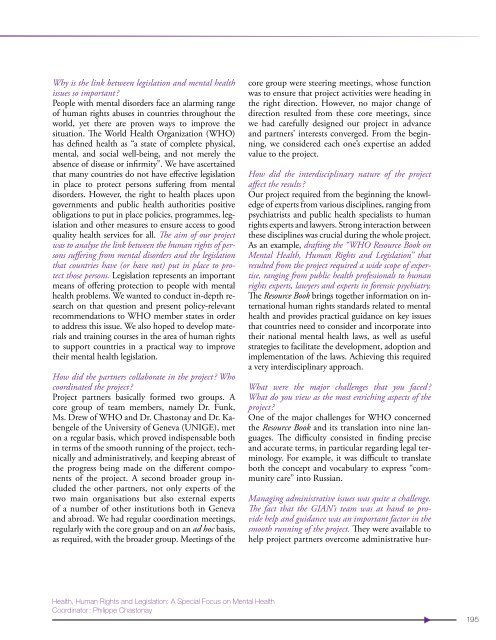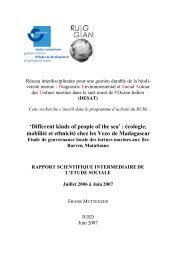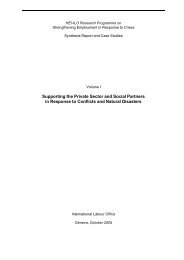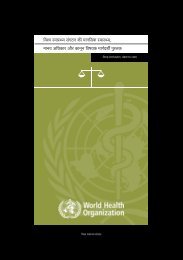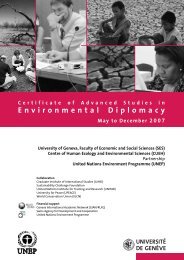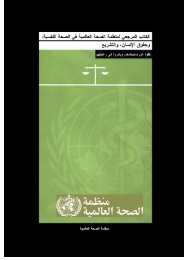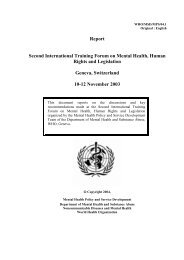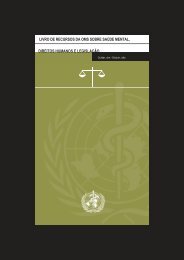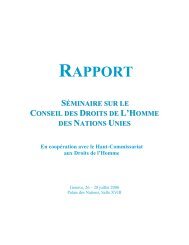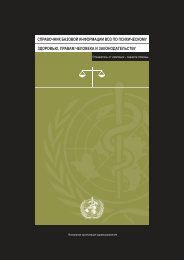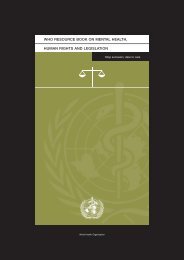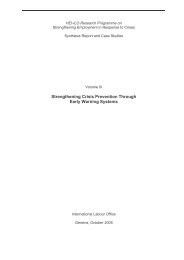Les liaisons fructueuses - RUIG-GIAN
Les liaisons fructueuses - RUIG-GIAN
Les liaisons fructueuses - RUIG-GIAN
Create successful ePaper yourself
Turn your PDF publications into a flip-book with our unique Google optimized e-Paper software.
Why is the link between legislation and mental health<br />
issues so important ?<br />
People with mental disorders face an alarming range<br />
of human rights abuses in countries throughout the<br />
world, yet there are proven ways to improve the<br />
situation. The World Health Organization (WHO)<br />
has defined health as “a state of complete physical,<br />
mental, and social well-being, and not merely the<br />
absence of disease or infirmity”. We have ascertained<br />
that many countries do not have effective legislation<br />
in place to protect persons suffering from mental<br />
disorders. However, the right to health places upon<br />
governments and public health authorities positive<br />
obligations to put in place policies, programmes, legislation<br />
and other measures to ensure access to good<br />
quality health services for all. The aim of our project<br />
was to analyse the link between the human rights of persons<br />
suffering from mental disorders and the legislation<br />
that countries have (or have not) put in place to protect<br />
those persons. Legislation represents an important<br />
means of offering protection to people with mental<br />
health problems. We wanted to conduct in-depth research<br />
on that question and present policy-relevant<br />
recommendations to WHO member states in order<br />
to address this issue. We also hoped to develop materials<br />
and training courses in the area of human rights<br />
to support countries in a practical way to improve<br />
their mental health legislation.<br />
How did the partners collaborate in the project ? Who<br />
coordinated the project ?<br />
Project partners basically formed two groups. A<br />
core group of team members, namely Dr. Funk,<br />
Ms. Drew of WHO and Dr. Chastonay and Dr. Kabengele<br />
of the University of Geneva (UNIGE), met<br />
on a regular basis, which proved indispensable both<br />
in terms of the smooth running of the project, technically<br />
and administratively, and keeping abreast of<br />
the progress being made on the different components<br />
of the project. A second broader group included<br />
the other partners, not only experts of the<br />
two main organisations but also external experts<br />
of a number of other institutions both in Geneva<br />
and abroad. We had regular coordination meetings,<br />
regularly with the core group and on an ad hoc basis,<br />
as required, with the broader group. Meetings of the<br />
core group were steering meetings, whose function<br />
was to ensure that project activities were heading in<br />
the right direction. However, no major change of<br />
direction resulted from these core meetings, since<br />
we had carefully designed our project in advance<br />
and partners’ interests converged. From the beginning,<br />
we considered each one’s expertise an added<br />
value to the project.<br />
How did the interdisciplinary nature of the project<br />
affect the results ?<br />
Our project required from the beginning the knowledge<br />
of experts from various disciplines, ranging from<br />
psychiatrists and public health specialists to human<br />
rights experts and lawyers. Strong interaction between<br />
these disciplines was crucial during the whole project.<br />
As an example, drafting the “WHO Resource Book on<br />
Mental Health, Human Rights and Legislation” that<br />
resulted from the project required a wide scope of expertise,<br />
ranging from public health professionals to human<br />
rights experts, lawyers and experts in forensic psychiatry.<br />
The Resource Book brings together information on international<br />
human rights standards related to mental<br />
health and provides practical guidance on key issues<br />
that countries need to consider and incorporate into<br />
their national mental health laws, as well as useful<br />
strategies to facilitate the development, adoption and<br />
implementation of the laws. Achieving this required<br />
a very interdisciplinary approach.<br />
What were the major challenges that you faced ?<br />
What do you view as the most enriching aspects of the<br />
project ?<br />
One of the major challenges for WHO concerned<br />
the Resource Book and its translation into nine languages.<br />
The difficulty consisted in finding precise<br />
and accurate terms, in particular regarding legal terminology.<br />
For example, it was difficult to translate<br />
both the concept and vocabulary to express “community<br />
care” into Russian.<br />
Managing administrative issues was quite a challenge.<br />
The fact that the <strong>GIAN</strong>’s team was at hand to provide<br />
help and guidance was an important factor in the<br />
smooth running of the project. They were available to<br />
help project partners overcome administrative hur-<br />
Health, Human Rights and Legislation: A Special Focus on Mental Health<br />
Coordinator : Philippe Chastonay<br />
195


